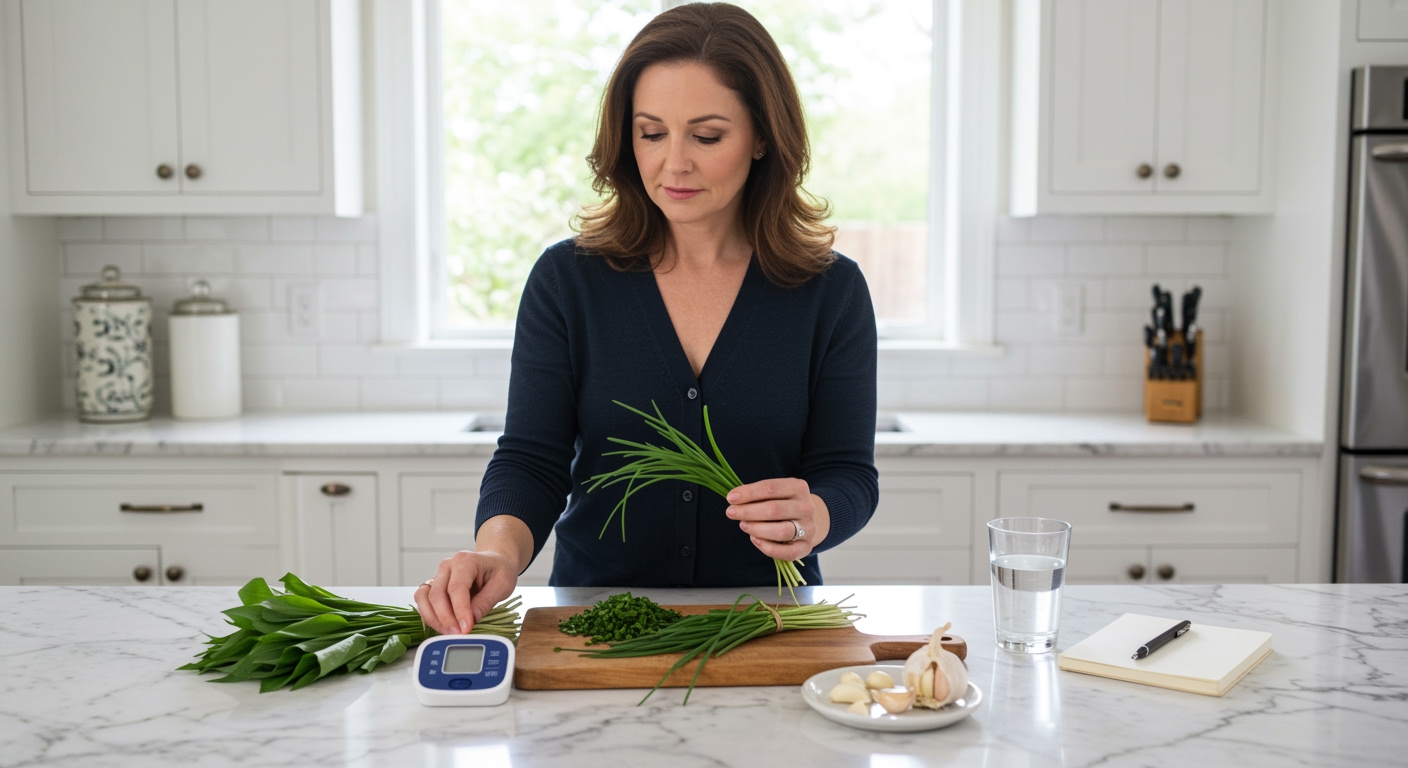✪ Key Takeaway: Wild chives may help lower blood pressure through sulfur compounds, but evidence is limited and effects are mild.
Introduction
You walk through your garden and spot those familiar green shoots poking through the soil.
Wild chives grow everywhere, and you might wonder if these common herbs could help with your blood pressure concerns.
Hi, I’m Abdur, your nutrition coach, and today I’m going to explain whether wild chives can actually lower your blood pressure and what the science tells us about this popular claim.
What Makes Wild Chives Different From Regular Chives?
Wild chives belong to the same family as garlic and onions, but they pack a more concentrated punch of active compounds.
These hardy plants grow naturally in many climates and contain higher levels of sulfur compounds compared to their cultivated cousins.
The key difference lies in their allicin content, which forms when you crush or chop the leaves.
Wild varieties also contain more flavonoids and antioxidants because they must survive harsh outdoor conditions without human care.
This survival mechanism creates plants with stronger defensive compounds that may benefit human health.
✪ Fact: Wild chives contain up to 40% more sulfur compounds than store-bought varieties.
How Do Wild Chives Affect Your Blood Vessels?
The sulfur compounds in wild chives work by triggering nitric oxide production in your blood vessel walls.
Nitric oxide acts as a natural vasodilator, which means it helps your blood vessels relax and widen.
When your vessels dilate, blood flows more easily and puts less pressure on your arterial walls.
The process happens gradually over several hours after you consume the chives, not immediately like some medications.
Wild chives also contain potassium, which helps balance sodium levels and supports healthy blood pressure regulation.
However, the amounts you typically eat in food are quite small compared to therapeutic doses studied in research.
✪ Pro Tip: Crush wild chives just before eating to maximize allicin formation and potential benefits.
What Does The Research Actually Show?
Most studies on chives and blood pressure focus on garlic and onions rather than chives specifically.
The limited research on chives shows modest effects on cardiovascular health markers in laboratory settings.
One small study found that people who regularly consumed allium vegetables had slightly lower blood pressure readings over time.
However, this study included garlic, onions, and chives together, making it impossible to isolate chives’ specific contribution.
Animal studies suggest that concentrated chive extracts may help reduce blood pressure, but human trials are lacking.
The evidence remains preliminary and cannot support strong claims about wild chives as a blood pressure treatment.
✪ Note: No major medical organization recommends chives as a primary blood pressure treatment.
How Much Would You Need To Eat For Any Effect?
Based on studies of similar allium plants, you would need to consume large amounts of wild chives daily.
We’re talking about several tablespoons of fresh chives every day, not just a sprinkle on your eggs.
Most people use chives as a garnish or flavoring, consuming only small amounts that are unlikely to have measurable effects.
The therapeutic dose would be similar to eating a small onion’s worth of active compounds daily.
This amount could cause digestive upset in sensitive people and might interact with blood-thinning medications.
Even then, any blood pressure reduction would likely be minimal compared to proven treatments like medication and lifestyle changes.
✪ Pro Tip: Focus on proven blood pressure strategies rather than relying on herbs alone for management.
Are There Any Risks To Consider?
Wild chives are generally safe for most people when consumed in normal food amounts.
However, eating large quantities could cause stomach irritation, heartburn, or digestive discomfort.
People taking blood-thinning medications should be cautious because chives contain compounds that may enhance these effects.
Wild chives might also interact with diabetes medications by affecting blood sugar levels.
Some people experience allergic reactions to allium plants, including skin rashes or respiratory symptoms.
If you have existing health conditions or take medications, consult your doctor before using wild chives medicinally.
✪ Note: Always identify wild chives correctly before consuming, as some toxic plants look similar.
The Bottom Line
Wild chives may offer mild cardiovascular benefits through their sulfur compounds, but they cannot replace proven blood pressure treatments.
Real health improvements come from consistent daily habits, not miracle foods, and wild chives work best as part of an overall healthy eating pattern.
I would love to hear about your experiences with wild chives or any questions you have about natural approaches to blood pressure management in the comments below.
References
At NutritionCrown, we use quality and credible sources to ensure our content is accurate and trustworthy. Below are the sources referenced in creating this article:
- White Rabbit Institute: Chive Health Benefits
- Vitabase: Relationship Between Hypertension and Chive
- Lybrate: 8 Health Benefits of Chives You Must Know About





